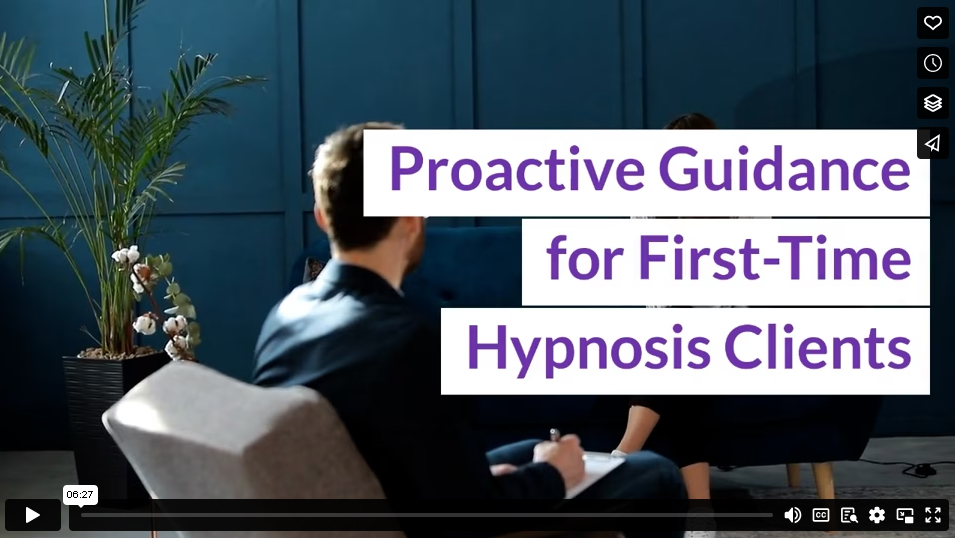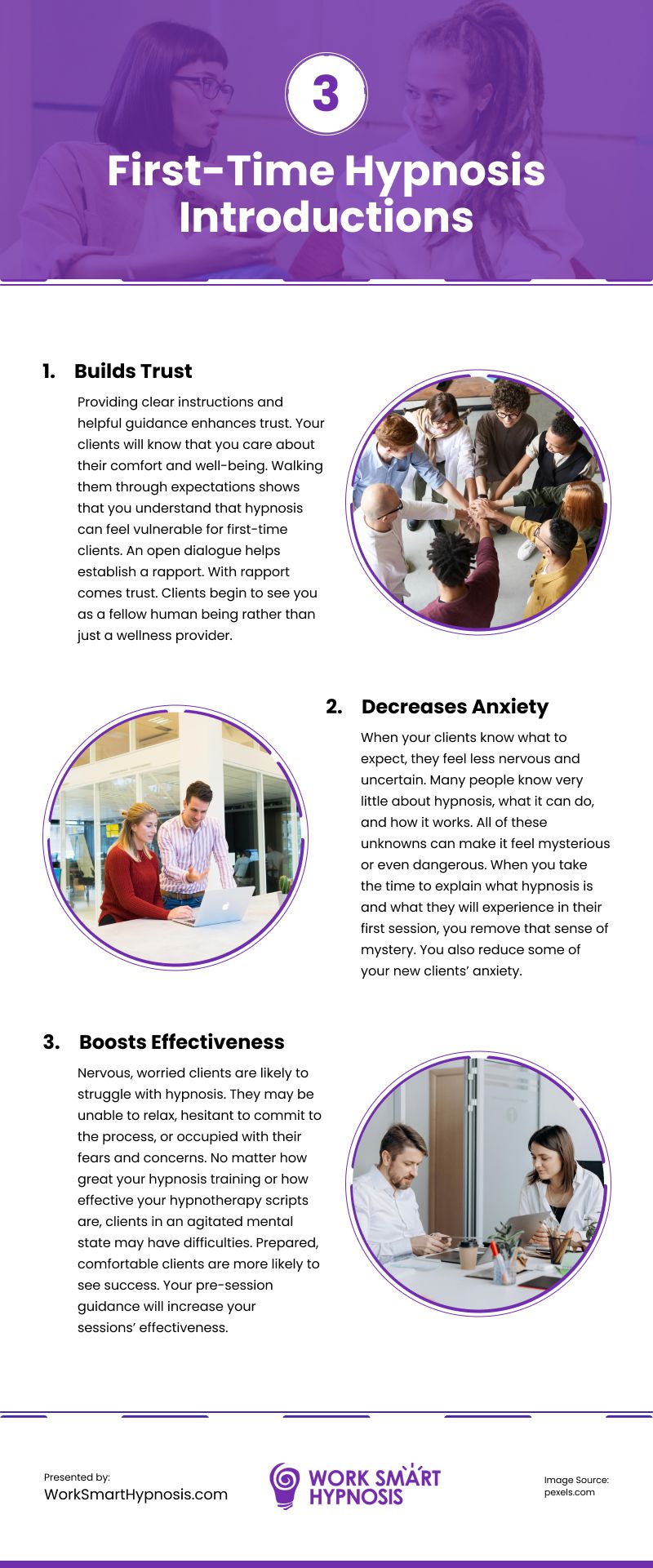For professional hypnotists, setting the stage for a successful session starts well before the clients first walk through the door or log on to a virtual session. Before a session, educating your clients on what to do—and what not to do—is vital for helping them feel comfortable, relaxed, and open to reaching a hypnotic state.
Here’s our guide to help professional hypnotherapists offer proactive guidance to their clients. This guidance can pave the way for clients to have a smooth, effective experience with hypnosis.
What is Proactive Guidance?
Proactive guidance means taking time before a client’s first session to help them understand the hypnosis process. You can offer tips to help them prepare and insights to put them at ease. That way, they know what to expect from their first session. They will show up ready to begin tackling their challenges using the power of hypnosis.
You can offer this guidance via phone call, video chat, or a printed information packet. Ideally, you can have a conversation with your new client, followed by an email or handout that reviews what you’ve told them. By communicating in both ways, you can interact with your clients personally and reinforce what you’ve told them in writing.
Benefits of Proactive Guidance Before Beginning Hypnosis
Builds Trust
Providing clear instructions and helpful guidance enhances trust. Your clients will know that you care about their comfort and well-being. Walking them through expectations shows that you understand that hypnosis can feel vulnerable for first-time clients.
An open dialogue helps establish a rapport. With rapport comes trust. Clients begin to see you as a fellow human being rather than just a wellness provider. They also know you are doing what you can to help them through the process, which is a wonderful basis for trust.
Trust makes your clients more comfortable. It can also make it easier for them to reach a hypnotic state when you begin your sessions.
Decreases Anxiety
When your clients know what to expect, they feel less nervous and uncertain. Many people know very little about hypnosis, what it can do, and how it works. All of these unknowns can make it feel mysterious or even dangerous. When you take the time to explain what hypnosis is and what they will experience in their first session, you remove that sense of mystery. You also reduce some of your new clients’ anxiety.
Boosts Effectiveness
Nervous, worried clients are likely to struggle with hypnosis. They may be unable to relax, hesitant to commit to the process, or occupied with their fears and concerns. No matter how great your hypnosis training or how effective your hypnotherapy scripts are, clients in an agitated mental state may have difficulties. Prepared, comfortable clients are more likely to see success. Your pre-session guidance will increase your sessions’ effectiveness.
Questions to Answer Before a First Session
An excellent place to start guidance is by answering common questions about hypnosis. Proactively addressing these questions can foster a sense of safety and readiness. Here are some of the concerns shared by many new clients:
- Can I get stuck in a hypnotic trance?
- Will I lose control?
- Will I do things I might regret or feel embarrassed about later?
- What if I can’t be hypnotized?
- How does it feel to be hypnotized? How will I feel after a session?
- What is a session like? What will I experience?
During your pre-session conversation, bring up these subjects. Provide brief answers to each question. Ask the client if they have additional concerns about these or any other questions. If so, you can provide more in-depth answers. Your informational packet can also offer longer explanations.
Preparation Tips for Clients
You know that a prepared, relaxed client is more receptive to hypnosis. Your clients may not know what to do to prepare. That uncertainty can make them feel anxious and uncertain. Giving them specific tips on how to prepare helps them arrive at their session ready to be hypnotized.
Here are some recommendations you can provide to your clients:
Dress Comfortably
Advise clients to wear comfortable, loose-fitting clothing. Suggest they wear clothes that allow them to sit, lie down, or move around without feeling restricted.
Eat a Light Meal
Clients shouldn’t be starving or overly full when they attend their session. Let your clients know they shouldn’t come to their sessions on an empty stomach. However, a heavy meal shortly before hypnosis could leave them feeling uncomfortable or burdened. Ideally, they will have eaten a light meal a few hours before their appointment.
Stay Hydrated
Proper hydration is essential for overall health and can contribute to mental clarity. Suggest that clients always drink plenty of water, especially on the morning of their session. If they are dehydrated, they may experience fatigue or difficulty concentrating.
Arrive with Plenty of Time
Encourage your clients to arrive a few minutes early for their sessions. If they show up stressed because a red light or unexpected traffic slowed them down, they won’t be in the best mental state for their session. Rushing to the appointment or worrying about time can drive up stress levels, making it harder to relax when they arrive. If they give themselves a few extra minutes, they won’t be stressed from watching the clock on their way to you.
For virtual sessions, suggest clients log on a few minutes early and check their audio, video, and internet connection. That way, they are ready to begin the session at the beginning of the appointment.
Skip Stimulants
While your client may be coming to you for help kicking a coffee or nicotine habit, it’s best if they can avoid stimulants for at least an hour—and ideally three or more hours—before their session. Skipping these items promotes a calm and receptive state.
Avoid Stressful Conversations and Situations
A client who has just broken up with a significant other or had a confrontation with their in-laws is not going to be in the best state for hypnosis. While we can’t always control when stressful situations happen, let your clients know that emotional agitation can make it challenging to relax in a session. It’s best if they can steer clear of these situations before hypnotherapy.
Proactive guidance means educating your clients about pre-hypnosis dos and don’ts, as well as helping them understand the hypnotic process. This education is an essential part of your professional hypnosis practice.
Providing clear, gentle guidance helps your clients feel more at ease, lets them know what to expect, and guides them through how to prepare. This preparation will help them achieve better results.
Remember that your role begins before a client walks through your door or logs on for a session. Proactive guidance empowers your clients with education and preparation, setting the stage for transformative experiences with hypnosis.
Video
Infographic
Professional hypnotists need to establish a positive environment before clients arrive or log in for sessions. Educating clients on what to do—and what to avoid—helps them feel comfortable. Discover this infographic to learn the benefits of proactive guidance before beginning hypnosis.





